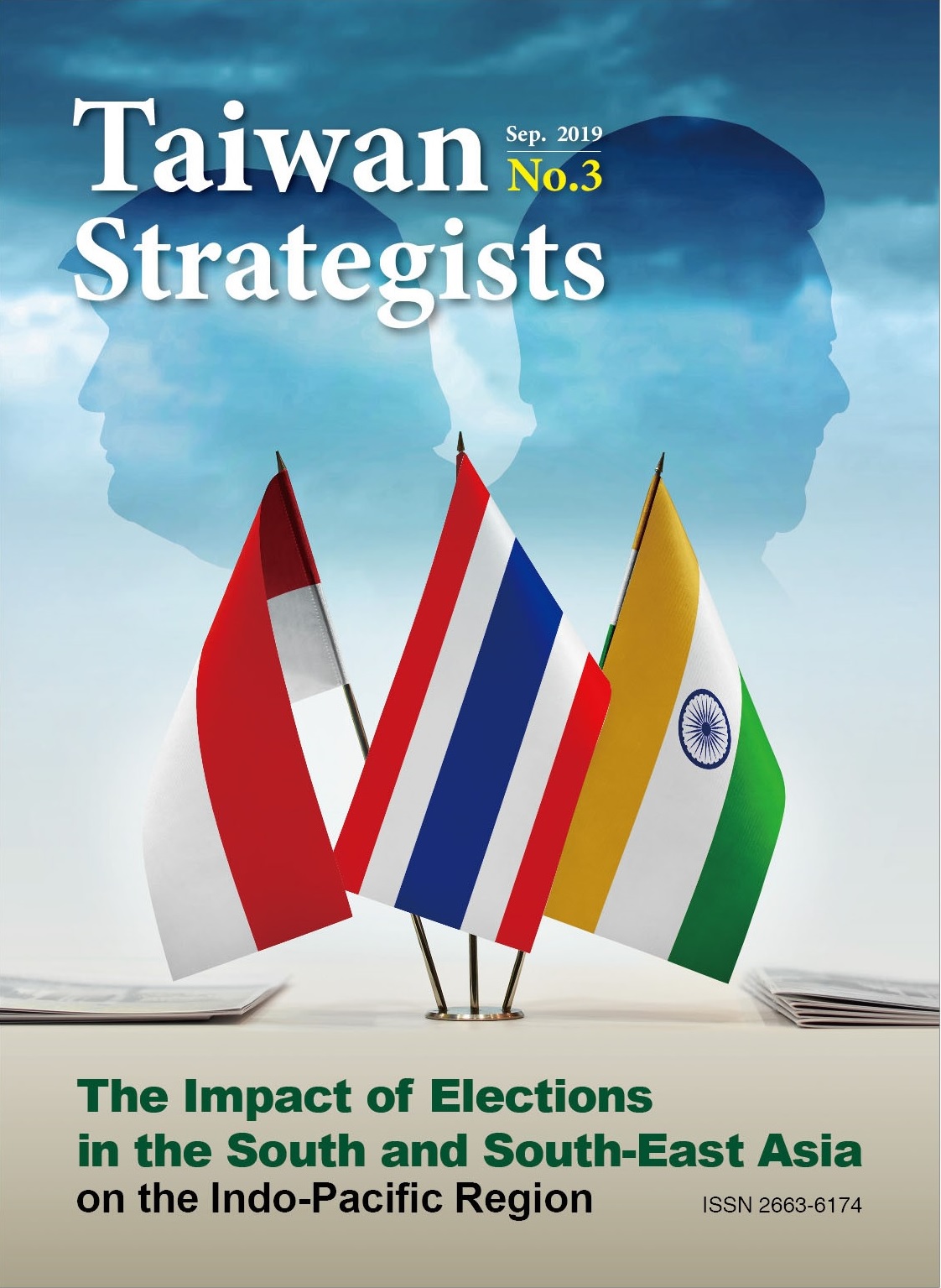The Impact of Elections in the South and South-East Asia on the Indo-Pacific Region
Taiwan Strategists No.3 (September 2019)
When Modi's “Indo-Pacific Concept” Meets Trump's “Indo-Pacific Strategy”:
Possibilities for Further Convergence and Implications for Taiwan
Associate Professor & Chair,
Centre for South and Southeast Asia Studies,
FLAME University, India
With the historic victory won in the Lok Sabha by the Bharatiya Janata Party (BJP), Narendra Modi begins his second term as Prime Minister of India. New Delhi will continue its participation in Indo-Pacific affairs with enhanced multilateral or multiple bilateral collaboration under its “Indo-Pacific Concept (IPC).” An important purpose is to offset the influence of China by introducing more players into the region, but doing so might risk attenuating the relationship with the US, especially when Russia and Iran are brought into the game. Nevertheless, there exists great potential for New Delhi and Washington to collaborate under the banner of Indo-Pacific when the US enhances the economic part of its Indo-Pacific Strategy (IPS) by focusing more on trade, investment, and infrastructure, with which India can connect and relate its development strategy. For Taiwan, the prospective convergence of the Indian IPC and the US IPS can bring opportunities, but the possible pendulum change in Indo-Chinese relations also deserves considerable attention.
Keywords: Indo-Pacific, 2019 Lok Sabha Election, Narendra Modi, Indian Foreign Policy, Bharatiya Janata Party
Indonesia’s Foreign Policy toward the U.S.’s Indo-Pacific Strategy in the Context of Rising China
Assistant Professor,
Department of Diplomacy and International Relations,
Tamkang University
This article analyzes Indonesia’s foreign policy in the context of the confrontation between the U.S. and China in the Indo-acific region. The U.S. Indo-Pacific strategy first was proposed by President Obama and implemented by Secretary of State Hillary Clinton. President Trump further re-arranged the U.S.’s international engagements strictly to make sure “America first”. This article will discuss the following topics. What are the attitudes of Indonesia toward the U.S. and China, the current great powers in the region? How important is Indonesia to the U.S. in its Indo-Pacific strategy? What was and is Indonesia’s foreign policy under President Susilo Bambang Yudhoyono (2004-2014) and President Joko Widodo (2014 onwards)? How did or do they lead the country to respond to the U.S. Indo-Pacific strategy? Finally, what are the Joko Widodo administration’s possible future policies toward Taiwan?
Keywords: Indonesia, Indo-Pacific Strategy, Joko Widodo (Jokowi), Susilo Bambang Yudhoyono, Taiwan
The Implications of the 2019 Thailand Election for the US Indo-Pacific Strategy
In March 2019, Thailand held its first effective election in eight years and elected the Palang Pracharat Party and General Prayuth Chan-ocha into office again. Noting strategic competition between the United States and China in Southeast Asia since 2008, the outcome of the Thai election holds great implications for great power relations and the Asia-Pacific region. Reviewing the election and the situation in Southeast Asia, this article claims that Thailand, caught between Washington’s and Beijing’s efforts to strengthen relations, will seek to adopt a balancing strategy that keeps both powers at equal distance while pursuing its own national interests. The author remains reserved over the development of Thai-US relations and more optimistic over Thai-Chinese relations. The article consists of five parts: part one reviews the recent Thai election; part two discusses the US Indo-Pacific Strategy and its implications for Thailand; parts three and four consider Thailand’s relations with China and Taiwan respectively; and part five concludes with some thoughts on the future of international relations in the Asia Pacific.
Keywords: Thai General Election 2019, Indo-Pacific Strategy, China Rising, Taiwan, Great Power Competition





